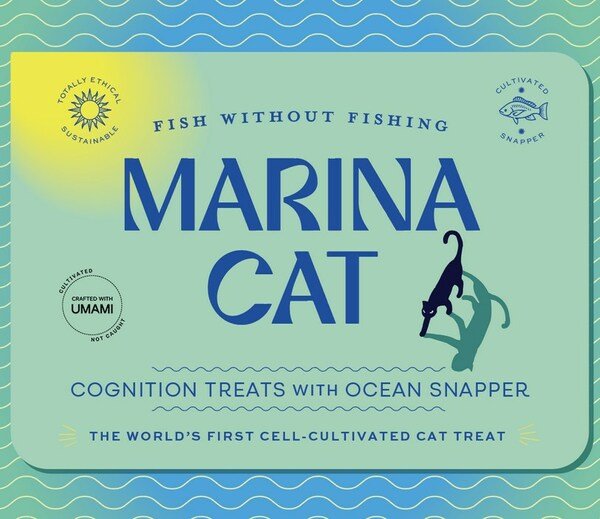World's First Cat Treat with Cell-Cultivated Fish Revealed
Marina Cat has all the animal-derived nutrition of caught or farmed fish, but none of the harmful environmental impacts of commercial fishing.
The world’s first cultivated fish cat food brand has been developed in a collaboration between Canadian cultivated meat innovator Cult Food Science and Singapore-based cultured seafood producer Umami Bioworks.
Marina Cat will blend Umami’s cultivated red ocean snapper and Cult’s cultured ingredient, Bmmune, a high-protein blend of nutritional yeast and fermentation products. Production is slated to begin later this year, with widespread availability expected in 2024.
The groundbreaking product aims to decrease the pressure on the ocean caused by the commercial fishing industry. In 2008, it was estimated that the amount of raw fishery products directly used by the cat food industry equates to 2.48 million metric tonnes per year.
The red snapper, categorized as vulnerable to extinction by the International Union for the Conservation of Nature (IUCN), has witnessed a staggering 96 percent reduction in total biomass from 1955 to 2010 within US waters, primarily attributed to fishing and the deterioration of its habitat.
Marina Cat presents a solution by delivering the complete spectrum of animal-derived nourishment found in caught or farmed fish, while completely avoiding the harmful environmental consequences of commercial fishing.
Mihir Pershad, CEO of Umami Bioworks said: "We are pleased to be embarking on this partnership with Marina Cat to power a new category of cultivated pet food products that are healthier for cats and better for our oceans.
“As a platform technology provider, we are committed to delivering the technology stack that powers commercialization of cultivated products across a range of applications. This first collaboration with Marina Cat and CULT Food Science is the first step to delivering on that promise.”
The pet food industry is a market worth $144 billion and is projected to experience a yearly growth of 5.3 percent until 2028.
Often overlooked is just how much companion animals are fueling the demand for meat - a staggering 30 percent of the meat consumed in the United States is eaten by dogs and cats.
Additionally, meat consumption by dogs and cats ranks just behind the total meat consumption of Russia, Brazil, the United States, and China, according to a study by the University of California, Los Angeles. This is leading innovative companies and tech start-ups to reimagine food for companion animals in more sustainable and healthy ways.
Other companies working to revolutionize the companion animal food industry through cell-based production include biotech company BioCraft (formerly Because Animals) which debuted the world’s first cultured meat pet food in 2021.
Elsewhere, Colorado-based company Bond Pet Food uses precision fermentation to produce real cultured meat proteins without hurting or slaughtering animals, while pet food company Wild Earth has created a sustainable, cell-based meat broth topper for dogs.
“My vision for the future is that we no longer have to slaughter other animals to feed our cats,” said Joshua Errett, vice president of product at CULT. “This brand brings me one very great step closer to making that a reality.”
Learn more about food system change, with the Species Unite podcast. Listen here.
We Have A Favor To Ask…
Species Unite amplifies well-researched solutions to some of the most abusive animal industries operating today.
At this crucial moment, with worldwide momentum for change building, it’s vital we share these animal-free solutions with the world - and we need your help.
We’re a nonprofit, and so to keep sharing these solutions, we’re relying on you - with your support, we can continue our essential work in growing a powerful community of animal advocates this year.
More stories:
Species Unite
A collection of stories of those who fight the good fight on behalf of animals.






A new study has revealed a landmark process that can now create bigger pieces of whole meat - without needing to farm an animal.